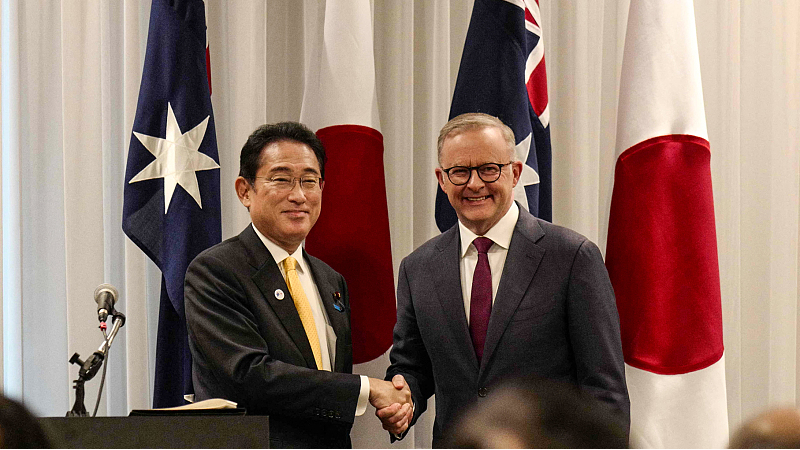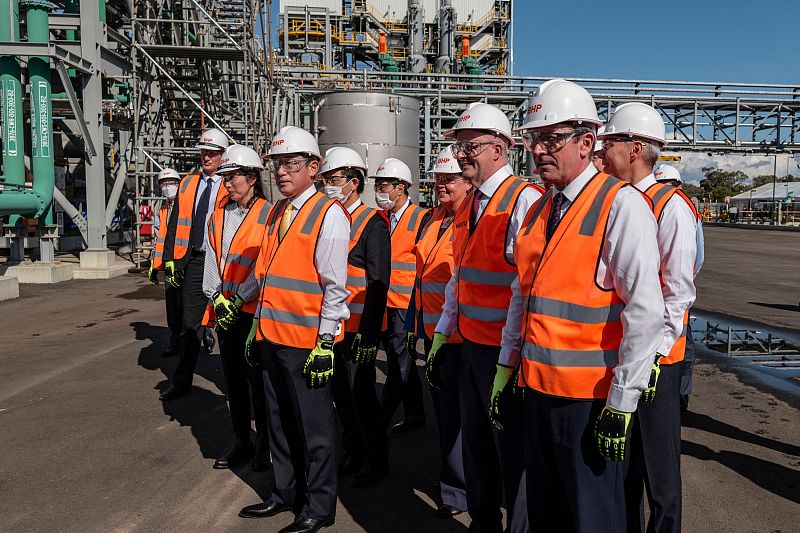
Australia's Prime Minister Anthony Albanese (R) shakes hands with Japanese Prime Minister Fumio Kishida after a press conference as part of their meeting in Perth, October 22, 2022. /CFP
Australia's Prime Minister Anthony Albanese (R) shakes hands with Japanese Prime Minister Fumio Kishida after a press conference as part of their meeting in Perth, October 22, 2022. /CFP
Editor's note: Daryl Guppy is an international financial technical analysis expert. He has provided a weekly Shanghai Index analysis for media for the Chinese mainland for more than a decade. Guppy appears regularly on CNBC Asia and is known as "The Chart Man." He is a national board member of the Australia China Business Council. The article reflects the author's opinions and not necessarily those of CGTN.
Japan is infamous in Western eyes for its swift ninja attacking moves. Japan's Prime Minister Fumio Kishida executed one of these moves in Perth, catching many defence and foreign affairs observers by surprise. What was supposed to be a stage managed confirmation of the Reciprocal Access Agreement turned into a full-blown treaty-style defence commitment that further trashed Japan's self-defence constitution?
The meeting was billed as a ratification of the Agreement which allows the partners to host each other's military forces and increase joint training exercises. Instead, the meeting went well beyond these parameters and announced a "Joint Declaration on Security Cooperation."
It is unclear if this acceleration was initiated at the request of the Australian government or the Japanese government. It fits neatly within Australia's growing fear of the ASEAN region and with Japan's decade long quest for re-militarization and repudiation of its self-defense restrictions.
The announcement bears the same imprint as the sudden AUKUS announcement in that it came without warning, without public or parliamentary policy debate in Australia and without consultation with countries in the ASEAN region. There are significant implications for both Australia and Japan in the announcement.
For Australia, the most important element of the new security deal is the provision to consult each other about respective threats to national security. This is similar to Australia's 1951 ANZUS treaty with the United States, which requires those two allies to "consult together" if their territorial integrity or security is threatened.
It appears the agreement does not go as far as Article 4 in the ANZUS treaty covering mutual defense obligation if there was an armed attack in the Pacific. However, as the full text of the agreement remains largely under wraps, it is not possible to verify this conclusion. Japan could not agree to a mutual defense obligation under its current Constitution but the intent to do so is becoming increasingly clear.
For Japan this agreement is another coup on the path to Japanese militarization that was started by former Prime Minister Shinzo Abe and which is continued by Prime Minister Kishida.
Under these two leaders, Japan is determinedly transitioning from its post-war pacific self-defense stance. It has clear aspirations to become a different kind of regional power.
Kishida maintains the declaration is confirmation of "consultations and consideration of responses regarding contingencies" that could affect regional security. The reference to regional security shows an intended over-reach that extends beyond the self-defence charter of Japanese defence forces.

Japan's Prime Minister Fumio Kishida (C), Australian Prime Minister Anthony Albanese (2R) and Western Australia's Premier Mark McGowan (R) visit the BHP Nickel refinery as part of their meeting in Perth, October 22, 2022. /CFP
Japan's Prime Minister Fumio Kishida (C), Australian Prime Minister Anthony Albanese (2R) and Western Australia's Premier Mark McGowan (R) visit the BHP Nickel refinery as part of their meeting in Perth, October 22, 2022. /CFP
Japan's ambassador to Australia, Shingo Yamagami, further hinted at just how far Japan is now considering what constitutes a region of Japan's interest. He said that Perth is the ideal setting – located at the geopolitical nexus of Australia and the Indo-Pacific, and the economic nexus of our own Japan-Australia relationship.
Senior Defence Ministry officials go further, advocating a military role beyond Japan's shores. In reference to a "Taiwan contingency," they told Japan's Yomiuru Shimbun newspaper that "We should be prepared for a joint response with the Self-Defense Forces (SDF)."
Despite the official Japanese Ministry of Foreign Affairs assertion that the agreement affirmed "their common purpose in working together, and with other countries through such fora as Asia Pacific Economic Cooperation, the ASEAN Regional Forum, and the East Asia Summit." It seems that these organizations were neither consulted nor informed of the announcement. Like the surprise AUKUS announcement, this may lead to a flurry of hasty diplomatic briefings within the region.
Many in the ASEAN region will view this expanded agreement with concern because it is with a country that has never fully reconciled its recent past. Running beneath the smooth mantle of trade relationships are deep currents of discomfort around Japan's refusal to acknowledge the forced prostitution of Korean woman, the biological and chemical weapons experimentation on civilians in North East China and the massacres in Nanjing and elsewhere. There has been no explicit rejection of the impact of Japan's previous ambitions and this leaves a level of unease as Japan moves further away from the constraints of its peace constitution.
Many in the region do not embrace Japan's move towards military expansion even if it is part of a broader U.S. and Australian supported engagement. Like Singapore, they acknowledge China's legitimate interests and prefer to deploy diplomacy rather than confrontation. They do not want war in their neighborhood. They are concerned about the extent of Japan's ambition and the ability to control its military cabal.
The importance of the Joint Declaration lies in the way it furthers Abe's and Kishida's long term ambitions to dismantle Japan's peace constitution. It further propels Australia's dis-engagement with many in the ASEAN region because it continues the trajectory towards conflict. Australia gives the impression of being unable to accept the new post-colonial world order.
Japan's ninja-like surprise has found a willing partner in its quest for remilitarization.
(If you want to contribute and have specific expertise, please contact us at opinions@cgtn.com. Follow @thouse_opinions on Twitter to discover the latest commentaries in the CGTN Opinion Section.)